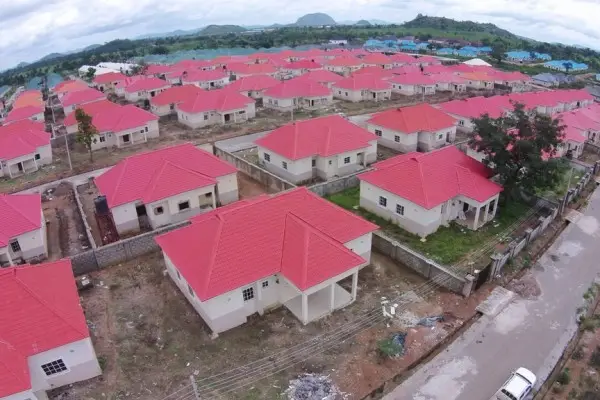PAG Felicitates Muslims on Commencement of Ramadan Fast
February 18, 2026TOP TEN MUSLIM UNIVERSITIES IN AFRICA
February 14, 2026ANALYSIS: Why Nigeria GDP is not the best in Africa Despite having the largest market
February 10, 2026Special Focus On How Dollarisation Causes Setback To Housing For Poor Initiative
Special Focus On How Dollarisation Causes Setback To Housing For Poor Initiative

Nigeria’s real estate sector operators may be struggling between the devil and the deep sea as they joggle the impact of exchange rate volatility on their business.
At the backdrop of the recent massive depreciation of the Naira INTEGRITY NEWS findings reveal that estate developers are likely to face more hurdles despite the dollarization of the elite class of their projects.
Some of the developers told this news medium that they had resorted to bench-marking their home sales and rental prices in US Dollars in recent years due to the steady depreciation of the local currency, but they lamented that the strategy appears overtaken by the steep rise in exchange rate recently.
Consequently, prices in Naira have skyrocketed while patronage has declined drastically in the past few months.
They also said that over 50 per cent of their clients now come from diaspora investors and home acquirers.
According to some of them, patronage would likely remain sustainable in prime locations in Lagos and Abuja which are the targets for the diaspora investors while other locations would likely be depressed by the rise in cost of the building resulting from the high exchange rate.
They noted that construction industry input is over 80 percent imported which has made it very vulnerable to exchange rate developments.
Just last week, Naira depreciated by 66 per cent to about N1,480/ USD1 in the official foreign exchange market while the parallel market rate hovered within N1,490/USD1.
Vanguard’s findings indicated that real estate developers who sell their properties in local currency also fix prices of the properties in Naira equivalent of the Dollar price due to the high import component of the Nigerian building industry.
Speaking on the current situation, Mr Debo Adejana, Chief Executive Officer, of Realty Point, a Lagos-based real estate firm said, “It is quite challenging now, as payment on an instalment basis is no longer feasible because of the steady rise in dollar rate to Naira’’.
Real estate developers usually structure payments in instalments for their clients but they said with the steady rise in the exchange rate, the transactions are increasingly ending up in the dispute over upward revaluations of outstanding amounts following rise in the exchange rate.
Adejana, a former exco member of Real Estate Developers’ Association of Nigeria (REDAN), said the exchange rate instability has caused serious problems in the real estate business in Nigeria.
He stated: “Because of this ugly trend, some developers cannot continue with their housing projects, and those who have managed to complete theirs cannot start new housing projects. It is only developers who collect payments in dollars and not Naira equivalent, can start new projects in Nigeria today because they are not affected as much as those that collect Naira”.
Also explaining the situation, Mr. Adekunle Abdul, Managing Director and Chief Executive Officer, Metro Group of Companies, a Lagos-based real estate development firm, said now more than 50 per cent of Nigeria’s real estate sector clients are in the diaspora.
Abdul who noted that the bulk of real estate investors in Nigeria are based abroad, pointed out that the naira to dollar exchange rate is a key indicator for a lot of investors.
According to him, “Whenever there are challenges with the foreign exchange market, such as the devaluation of the Naira, it results in an overall increase in prices. This devaluation has put significant pressure on developers and prospective real estate buyers.”
For Engr. Adekunle Raphael-Monehin, Managing Director, Tobykemsworth Investment Limited, a real estate development company, the high exchange rate has been posing a huge challenge to real estate sector in recent times as it has caused low off-take of housing units while housing projects across Nigeria have been stuck.
According to him, “It has made prices of everything starting from acquisition of land to building materials, local and imported to go up astronomically. For the imported items such as tiles and other finishing items, freight charges have gone up, cost of clearing has equally gone up just as local transportation charges are not friendly.
Beyond the real estate dollarization, some financial analysts who see the same trend across other sectors decried the overall impact of the foreign exchange market and called on the government to reign in on the perpetrators.
Speaking to our correspondent on the dollarization of transactions in Nigeria, Tajudeen Olayinka, Analyst/CEO, of Wyoming Capital and Partners, said: “In most of these cases, it is unlikely that dollar contracts will be agreed upon by contracting parties, rather, exchange rate at a particular point in time could be considered for actual settlement of dollar contracts in Naira equivalent.
‘‘If this is the consideration in most cases, the impact on dollar supply disruption will be minimal but an inflationary spiral could be the order of the day in as much as the dollar liquidity challenge persists in the foreign exchange market.
‘‘However, if dollar dollar-settled dollarisation contract is made mandatory by the contracting parties, it could then trigger a major currency crisis, output contraction and mass unemployment in the country, as parties to contracts suffer Dollar settlement problems or outright contract cancellations.
‘‘So, the implications are in many folds including dollar settled contracts creating major disruptions to market liquidity and exchange rate volatility.”
END.










